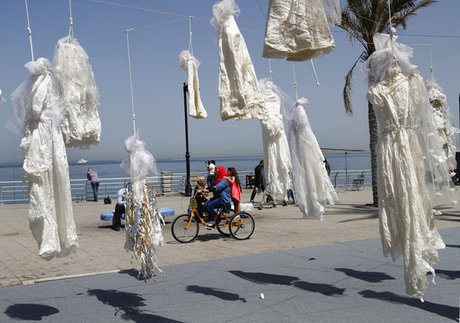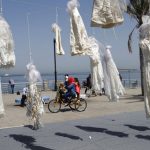Lebanese Activists Ramp Up Pressure on Reviled Rape Law

Lebanese activists have ramped up their campaign to scrap a controversial law allowing rapists who marry their victims to go free, with a dramatic installation on Saturday along Beirut’s sunny seaside.
A proposal to scrap Article 522 of the penal code — which deals with rape, assault, kidnapping and forced marriage — was introduced last year and approved by a parliamentary committee in February.
It will go before parliament on May 15 and activists hope that MPs will vote to eliminate it.
On Saturday they urged Lebanese citizens to sign a campaign to ramp up the pressure on legislators at an open-air exhibit.
Thirty-one wedding dresses made of white lace and wrapping paper hung limply from makeshift nooses between four palm trees along Beirut’s corniche.
“There are 31 days in a month and every single day, a woman may be raped and forced to marry her rapist,” said Alia Awada, advocacy manager at Lebanese non-government organization ABAAD.
“We are trying as much as we can to shed light on this issue and tell parliament that the time has come for them to vote on canceling Article 522.”
The reviled article, which also deals with the rape of minors, allows offenders to escape punishment by wedding their victims.
“If a valid marriage contract exists between the perpetrator of one of these crimes… and the abused, the prosecution is suspended,” it reads.
“If a verdict has been issued, the implementation is suspended.”
Awada said: “We called on all parliamentarians and decision-makers in the Lebanese state with this message: every ‘yes’ from you is a ‘no’ to a rapist.”
– ‘Stone age’ –
Standing amid the fluttering wedding dresses, Minister for Women’s Affairs Jean Oghassabian described the article as being “from the stone age.”
“Its turn has come, it’s the second item on the agenda” at an upcoming legislative session on May 15, Oghassabian, who is also an MP, told AFP.
Lebanese artist Mireille Honein, who designed the exhibition in Paris and brought it to her homeland this week, said she made the dresses out of white paper “to highlight the ephemeral nature of marriage and of laws.”
“And I hung them up, because this type of law simply robs women of their essence, leaves them without an identity and suspends them in a life that does not suit them and is shameful for those imposing it on them,” Honein told AFP.
As passersby paused to look at the ghostly installation, volunteers from ABAAD invited them to sign a petition demanding parliament prioritize the article’s elimination.
Silver-haired Rafiq Ajouri, who hails from a southern Lebanese village, was persuaded to sign on while on his morning stroll along the corniche.
“If I were to get raped, why wouldn’t I get my rights? I’d want people to stand beside me,” he said.
But the elderly man, who has five sons and three daughters, hesitated when an ABAAD volunteer said women should be allowed the same liberties as men.
“They can have their freedoms, but within limits. Why? Because they’re girls.”
© 2017, jean zouein. All rights reserved.













